The Cholesterol Lie
That’s Been Stealing Your Health for Decades
For years, you’ve heard the same warning:
“High cholesterol is bad. The lower it is, the better.”
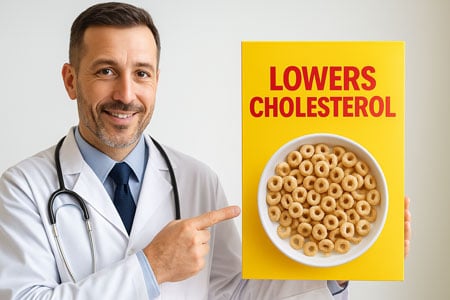
Doctors, drug ads, and even cereal boxes have repeated this message until it feels like an unquestionable truth.
But that truth is incomplete—dangerously incomplete.
Because cholesterol isn’t your enemy; it’s essential for life. And driving it down across the board, without understanding which type of cholesterol really matters, can backfire for your heart, your brain, and your future.
Why Your Body Actually Needs Cholesterol

Cholesterol is not just some useless “gunk” floating around in your blood. Your body depends on it for:
Brain health – The human brain is nearly 60% fat, and cholesterol plays a vital role in memory and cognitive function. Research links healthy HDL (“good cholesterol”) levels to better mental sharpness and lower Alzheimer’s risk . – Pub Med
Hormone production – Estrogen, testosterone, cortisol—all are made from cholesterol.
Cell repair – Every single cell in your body needs cholesterol for structure and resilience.
When cholesterol drops too low, it’s like trying to build a brick house without bricks—you simply can’t.
The Real Danger: Small, Dense LDL (sdLDL)
While people are catching on that cholesterol is not necessarily bad for you, they are missing this one important part:
LDL (bad) cholesterol is not one thing. It exists as particles of different sizes and densities.
Not all cholesterol is the same.
You’ve probably heard of LDL (“bad cholesterol”) and HDL (“good cholesterol”). But here’s what they don’t tell you—there are different types of LDL, and one in particular is the real troublemaker:
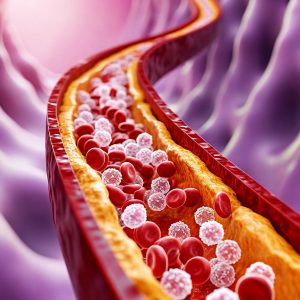
Small, dense LDL (sdLDL).
This type of cholesterol:
Slips easily into artery walls
Oxidizes quickly, turning toxic
Triggers inflammation and plaque buildup
Multiple studies show sdLDL is more strongly linked to heart disease than total LDL levels. – LabCorp
The worst part?
Most traditional lipid panels skip sdLDL entirely. You could have “normal” total LDL numbers—but still carry a dangerous amount of tiny, damaging particles—unless you request this advanced test.
💡 Health Tip
Most doctors don’t even test for sdLDL unless you request it by name (it’s called an LDL Particle Size Test or NMR LipoProfile).
That’s exactly why Tikva Heart was created—to help lower sdLDL naturally, protect your HDL, and improve circulation, all without wiping out the cholesterol your body needs.
Keep reading to see why sdLDL is the most dangerous cholesterol—and how to fight it naturally.
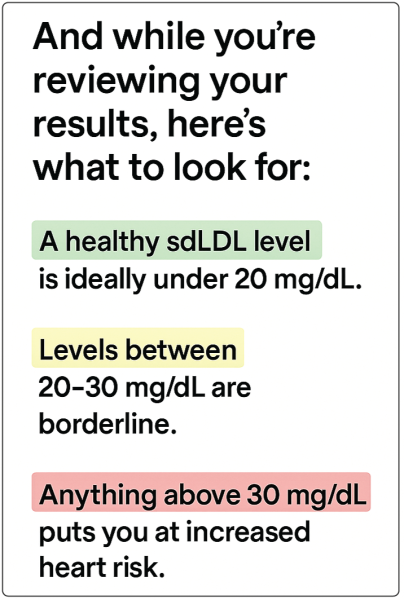
The Statin Dilemma
Statin drugs are the go-to prescription for lowering cholesterol, and yes—they can reduce heart attack risk, especially in high-risk patients.
But here’s the problem no one talks about:
They don’t just lower the “bad” stuff. They wipe out all cholesterol—good, bad, and everything in between. That means your HDL, the cholesterol that protects your heart and brain, can drop too. And they still don’t target the real culprit—sdLDL.

For many, the side effects can be life-altering :
Muscle pain or weakness that never fully goes away
Digestive distress that makes every meal a gamble
Memory lapses that leave you feeling… not yourself
Higher blood sugar, pushing you toward diabetes
Rare but dangerous liver damage or rhabdomyolysis
For some, the trade-off is simply too high—especially when safer, natural options exist that protect the good while targeting the bad. – (Mayo Clinic , FDA)
The Smarter Way: Target the Bad Without Losing the Good
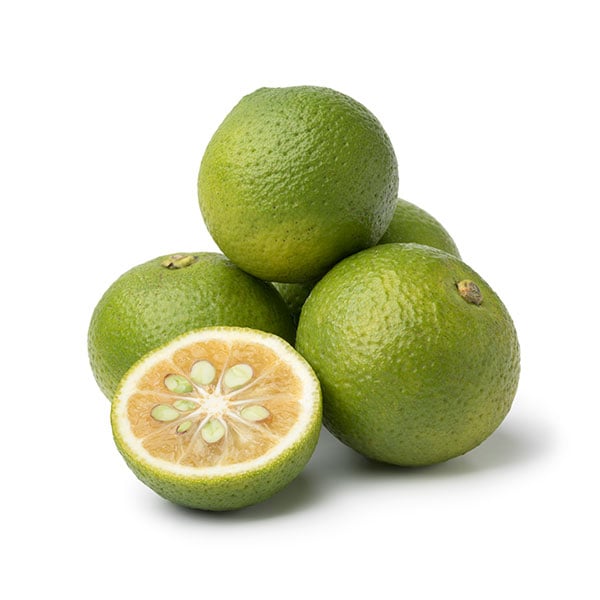
Imagine lowering the cholesterol that actually causes heart attacks—without stripping away the cholesterol your body needs.
That’s what targeted, natural approaches can do.
One of the most researched is Citrus Bergamot—a key ingredient in Tikva Heart—which in clinical trials has been shown to:
Reduce sdLDL specifically
Improve overall cholesterol balance
Reduce inflammation and improve artery flexibility
Citrus Bergamot can be found as an individual supplement or as one of 32 heart healthy nutrients in TIKVA HEART.
Other Nutrients in Tikva Heart That Naturally Target sdLDL (or Make It Less Harmful)
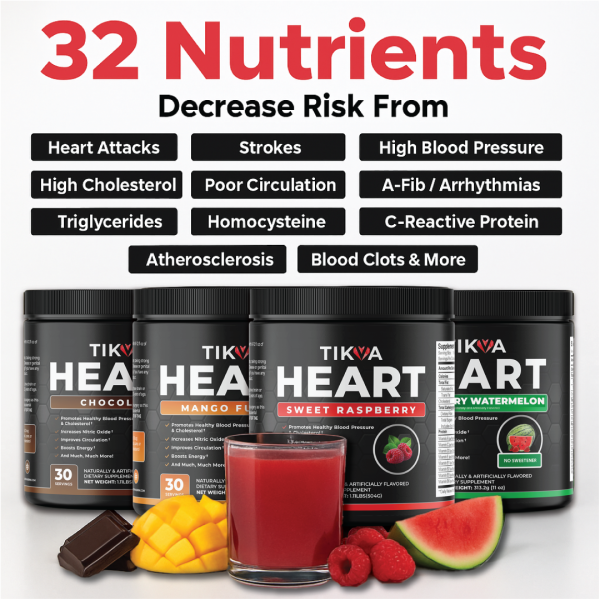
Tikva Heart doesn’t rely on one ingredient. It includes multiple, clinically studied nutrients that shift LDL toward larger, less atherogenic particles and/or reduce LDL oxidation:
Niacinamide (Vitamin B3) — increases LDL particle size (shifting away from small, dense particles) and raises HDL. – PubMedScienceDirect
Magnesium — evidence is mixed overall, but meta-analyses and trials suggest modest LDL improvements in some groups and beneficial effects on metabolic health (which tracks with sdLDL). – PubMedNature
Coenzyme Q10 — reduces oxidative stress and improves lipid measures in human studies; oxidized (especially dense) LDL is the most atherogenic. – PubMed
Vitamins C & E — antioxidant support that raises LDL’s resistance to oxidation in vivo and in controlled studies. (Oxidation is one reason sdLDL is so damaging.) – AHA Journals
Why this matters: Smaller, denser LDL particles are both more likely to penetrate artery walls and more prone to oxidation—a key step in plaque formation. Shifting particle size upward and limiting oxidation addresses the quality of LDL, not just the quantity. – PubMed
Why This Matters for You and Your Family

If you’re 45+, your lipid pattern may naturally drift toward more sdLDL—even with “normal” totals.
Lowering the wrong thing can:
sap energy, affect memory & shorten the healthy years you have with the people who need you.
Focusing on the right targets—sdLDL, oxidation, inflammation, blood pressure, circulation—helps allow you to:
play with your grandkids without worry, travel with confidence & live independently, with vitality.
The Bottom Line
The cholesterol conversation must shift from “low is better” to “targeted is smarter.”
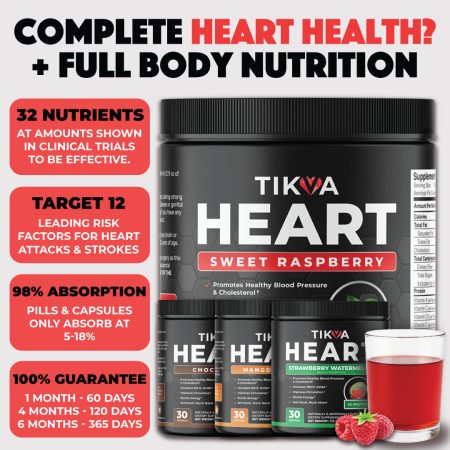
Tikva Heart was formulated with that in mind.
It includes all the key nutrients above—citrus bergamot, niacin, magnesium, CoQ10, and vitamins C & E—to target sdLDL and LDL oxidation.
It addresses the other 11 leading heart risk factors in a once-a-day, great-tasting drink with 32 nutrients.
Because it’s not just about lowering numbers on a chart — it’s about protecting your heart so you can watch your grandkids grow up, travel with the person you love, and stay independent for decades to come.”







